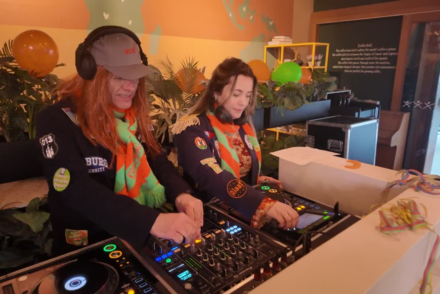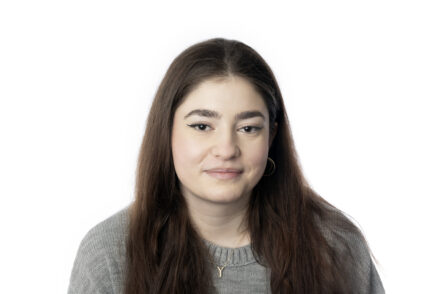Ammar Maleki: academic and activist
For Ammar Maleki, academia and activism are the same. Coming from Iran, he has witnessed the cruelties of a tyrannical system from nearby. “My father was severely tortured for being critical.”
Ammar Maleki is the son of a well-known Iranian human rights activist, who suffered years of imprisonment and severe torture for criticizing the regime. He is also an assistant professor in Comparative Politics at Tilburg University. Following in his father’s footsteps, Maleki joined the struggle for change in Iran. But the price he pays for being an activist scholar is high. He cannot return to Iran, while his father is forbidden to leave the country. Although it has been eight years since they last saw each other, they remain firmly united in their pursuit of a democratic Iran. “You can either be silent and exercise your basic rights, or you can be committed to what you believe in and be denied those rights. My father and I chose the second option.”
As the son of a human rights activist, did you become involved in political activism at a young age?
“I grew up in a political family. My father was a professor. After the Revolution in 1979, he became the first president of Tehran University. He believed in free universities and democratically elected university authorities, which wasn’t common in Iran. When my father was the dean of Tehran University, the new regime decided to have a ‘cultural revolution’. Universities were closed because they were not in line with the revolutionary Islam. My father was against the Cultural Revolution, and called it a ‘cultural coup’. Because of that, he was imprisoned. He was tortured severely for five years, and he was even sentenced to death at one point. After his release, he continued to be critical. He was arrested and imprisoned many times, in different stages of my life. But although I always had sympathy with my father’s dreams for a free and democratic Iran, I wasn’t political myself. Sometimes when you grow up in a political family, you become fed up with politics.”
When did that change?
“After I graduated from Tehran University in Automotive Engineering, I started working in one of the largest factories in Iran, a car factory. I worked there as a senior engineer for six years. I was happy with my job, I liked engineering. But I also understood that engineering is not the main issue we have in Iran. We don’t lack good engineers, we lack a good system. A free, democratic system. I decided to continue my education. I wanted to study political science, but I had a very technical background. When I was searching for a bridge between those two disciplines, I came across a new interdisciplinary field: engineering and public policy. One of the universities that offered this program was the Technical University of Delft. It was important for me to get funding somehow, because I wasn’t from a rich family. Luckily, I was able to get a grant from the Shell Centenary Scholarship Fund. And so I moved to the Netherlands with my wife, to start this new journey at the age of 30.”
What was it like for you to study at a Dutch university?
“It was fascinating. I had experiences that I never had in my life – being in a free society and studying at a free, liberal university. In Iran, there are a lot of restrictions. Here you can be critical, you can be involved in decision-making, you can organize gatherings. Together with other Iranian students, I established the first – and only – Iranian student association. We called our association the Iranian Students Society of TU Delft, or ISSTUD, which means ‘standing’ in Persian. I’m happy I got to be a part of that. I also enjoyed the courses I was following. I learned more about measuring different cultural values, how countries can be different based on cultural dimensions. That was very interesting to me, maybe because I could see the differences between two cultures. Iran has cultural dimensions that are completely opposite to those of the Netherlands. I wrote my master’s thesis on the way cultural differences affect public participation, and I graduated cum laude. That was great, even though I was going through a difficult time.”
Why was it a difficult time for you?
“When I started my Master’s in Delft, my wife got a PhD position in Materials Science. She had to go to Iran to obtain a visa to register as a PhD candidate, and I wanted to take that opportunity to visit my family. When we arrived at Tehran Airport, I was interrogated about my writings. I had written a book on civil disobedience, in which I introduced my theory of civil ‘misobedience’. That’s something we see a lot in Iran. It’s in between breaking the law and accepting it. For example, wearing a hijab is compulsory for women in Iran. Breaking that law can have grave consequences, so women started to wear a ‘bad’ hijab, a sexy hijab, as a form of protest. And there are many other examples of this kind of civil misobedience in Iran. I wrote about it, and it came to a book. At the airport I was interrogated about it. After four or five hours, I was released and we could enter the country. But once we were back in the Netherlands, I was told that it was no longer safe for me to travel to Iran. There was a lot of unrest at that time. When my father was imprisoned again and some of our friends were arrested, I understood that I could not go back. I haven’t seen my father since. He is banned to travel. I can’t go in, he can’t go out.”
After graduating from TU Delft, you obtained your PhD cum laude at Tilburg University, where you were subsequently appointed as an assistant professor. Do you see your academic work as a form of activism?
“Yes. For me, activism and academia are complementary to each other. In fact, I think that if you really want to do something, if you want to be part of the process of liberalization and democratization, you have to combine activism and academic knowledge. Without activism, you are just a theoretician. And as an activist, you need to understand theoretical concepts.”
Democracy and democratic systems are a central theme in your work. Is Iran a democracy?
“No. Only if a country has free, fair and frequent elections, it can be defined a democracy. Iran doesn’t meet those minimum criteria. We don’t have free and fair elections. Iran is an electoral theocracy. There are elections, but these elections are not free and fair. And only the president and the parliament are elected, while the highest person in power, the Supreme Leader, is not.”
What are you working on now?
“On designing compatible democracies. My hypothesis is that there aren’t simply ‘good’ and ‘bad’ models of democracy. If a certain democratic system works well in one country, you can’t just transplant it to another country and expect it to be successful there as well. You have to take into account cultural elements.”
Designing a democracy, is that like designing an automobile?
“In a way. When you’re designing a machine, you have different elements and you combine them in a specific way to produce a specific outcome. In a political system, there are different institutions that are similar to the elements of a machine. When you consider all of these elements and you arrange them in a compatible way, then you are designing democracy. But even though these types of designing are similar, it would be naïve to think they are the same. Humans are much less predictable than the mechanical components of an automobile.”
Do you miss Iran?
“Yes. It’s important for me to point out that Iran and the Iranian regime are two very different things. Iran is a country with a rich and old history, it has people who like many other people in the world want to have dignity and freedom. Iran contributes to the world’s cultural heritage, to science. I love my country, but many aspects of Iranian society are in decline because we don’t have a responsible, accountable, democratic government.”
Do you wish to return someday?
“I’d love to go back. But if I would go to Iran now, I would be imprisoned for being critical. I would have to spend years in prison. If I’m being realistic, I don’t think I’ll have the opportunity to go back any time soon. But I’d love to go back one day and contribute to the democratic transition of my country. I also hope to see my family again before it’s really late. That is my dream, but whether it can become a reality is another issue. Only God knows.”
This interview was originally published in Univers magazine #6, in December 2016.






